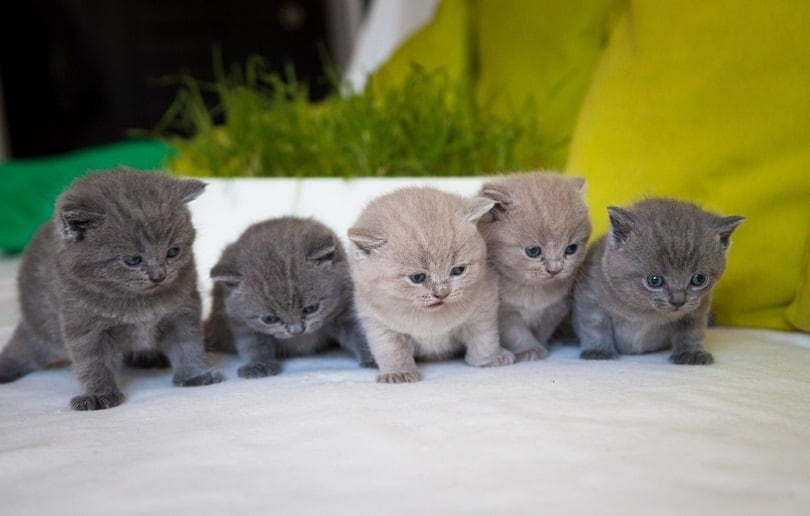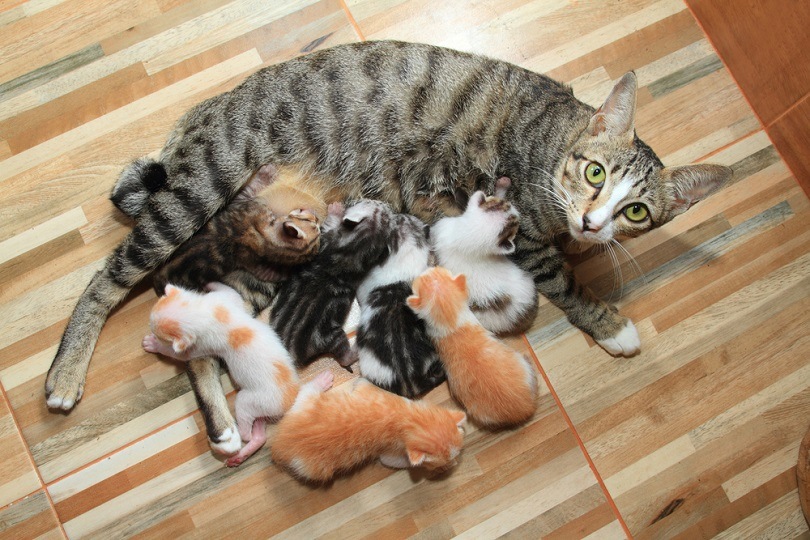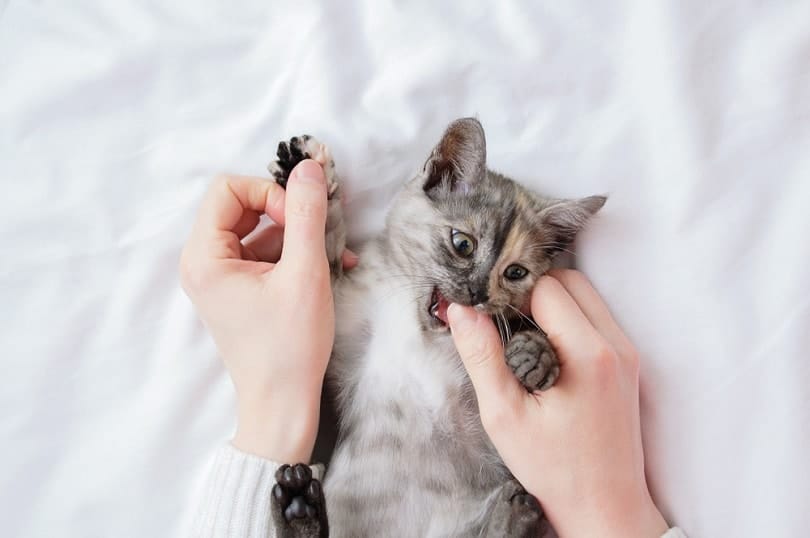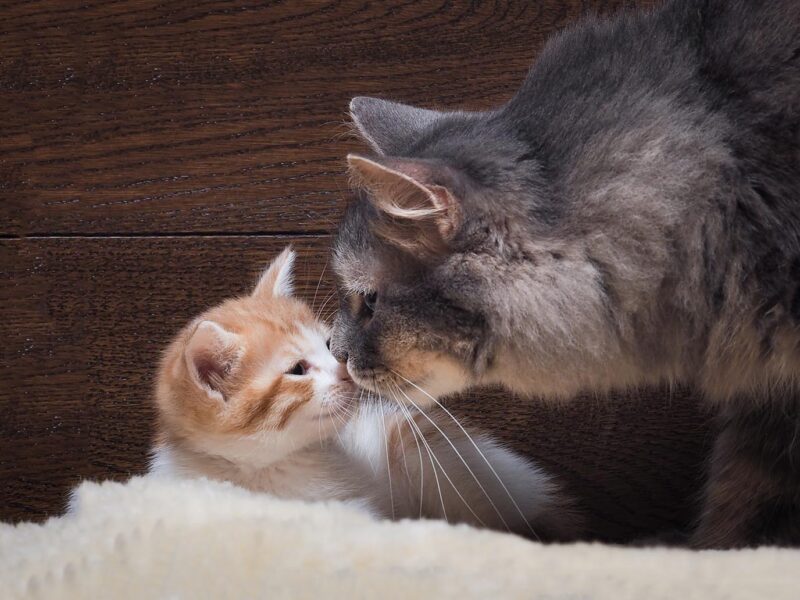There is no doubting the attraction of young kittens. They’re tiny, stumble around, and our instinct to protect them takes over. However, taking a kitten away from its mother too soon can be detrimental to the little furball.
Not only do mother cats wean their kittens and ensure that they are physically healthy, but they teach them to behave and how to interact with the world around them. While it is possible for a kitten to survive without its mother, and this happens often when a mother cat gets ill or is unable to look after its litter, the kitten would simply not receive the same level of care as it would from its natural mother.
While it is common to see kittens being put up for adoption between the ages of 8 and 10 weeks, when they have been weaned, it is better to wait until the young cat reaches 12 weeks of age. They have better developed, physically and emotionally, and have a better chance of leading a healthy and fulfilled life.

Kitten Development

Although it can take longer with some breeds, most kittens develop into adult cats by the time they reach 1 year of age. However, the most development and the greatest number of changes occur in the first 8 weeks.
Briefly, here are the major changes you can expect a kitten to undergo.
- 2 weeks – Kittens are born with their eyes closed and are deaf and blind for approximately the first week. By week 2, their eyes will open but their eyesight is still very limited so they should be kept away from bright lights. During the first 2 weeks, you will hear the kitten making little meowing noises to attract its mother’s attention.
- 4 weeks – By week 3, your kitten will have started purring and they will start to make more noise, especially as they walk around and investigate their surroundings a little more. At this time, a kitten’s eyes may start to change color and they will look more attentive with upright ears. They will have started to walk at 3 weeks, albeit very unsteadily, and during the fourth week, they will start to explore. Week 4 is when a kitten can start to balance upright, and it’s a good time to start the introduction of the litter box.
- 7 weeks – At 5 weeks, the kitten will start to develop some of its infamous curiosity. You should start to socialize them at this age, which means introducing them to the rest of the family, other animals, and new people. Let them adventure a little. At around this time, your kitten will be getting its first round of vaccinations, too. By this time, your kitten will have almost all of its baby teeth.
- 10 weeks – At around this stage, the kitten should be transitioning away from milk and onto solid food. At this age, they are still learning how to be a cat, and they will pick this up from their mothers. They still have a lot of key lessons to learn, including how to be agile little climbers and how to socialize.
- 12 weeks – By 12 weeks, the kittens should be fully weaned and socialized. This is when it is safe to take them away from their mother. 12 weeks is also the time when a kitten gets its next round of vaccination shots, which makes it a good time to adopt.
- 6 months – As long as your kitten was strong enough and weighed enough to cope with anesthesia, your vet may have performed spaying or neutering after 8 weeks, but most vets will want to wait until the cat reaches 6 months of age. By this stage, they have developed enough to deal with the anesthetic.
- 1 year – Most kittens have developed into fully-fledged adult cats by the time they reach one year of age. They may still charge around, play games, and indulge in other kitten-like behavior, but one-year-olds are adult cats, physiologically, at least. The cat may not display its adult personality until it reaches 24 months of age, however.
What Happens If a Kitten Is Removed From Its Mother Too Soon?

Kittens get nutrients, vitamins, and minerals from their mother.
- If they are taken away too soon, it can lead to an increased chance of illness. It could lead to your cat being sicker and physically smaller.
- Kittens also learn behavioral patterns, actions, and reactions, as well as social interactions, from their mother. If they are taken away too soon, you could end up with a grumpy cat that has not learned how to behave properly.
- This lack of social interaction and social cues from mom can also lead to an insecure and scared kitten, so yours may be jumpier than they would be if they had been left with mom for two more weeks.
- Another important skill that a kitten learns from its mother is how to use a litter tray. It is possible to teach a kitten how to use a tray, but its own mother would have better results and would teach the process naturally.
Can Kittens Survive Without Their Mothers?
If the kitten is very young, it will require regular bottle feeding, often every 2–3 hours through the course of the night. It will require a specific kitten formula that has been designed for motherless kittens, and it will require that you teach the kitten how to successfully use a litter tray and how to deal with new and potentially frightening situations. With that said, a kitten can survive without its mom, if it receives the proper and full care of a surrogate.
Will Mother Cats Reject Their Kittens If Humans Touch Them?

Mother cats will not reject kittens if they are touched by humans. However, if you find a kitten or litter of kittens, and you can’t see the mother, you should wait before taking them in. The mother may be hunting for food and due to return. Watch the area, or spread flour around the nesting site, and look for signs of disturbance when you return.
Do Cats Get Sad When Their Kittens Are Taken Away?
Separating a mother and her kittens can lead to sadness for the kittens and their mother. The mother may search the house and meow for her kittens for a couple of days before the mother goes back to her routine. Kittens can find it more difficult, with some becoming depressed and refusing to eat for several days.

Conclusion
Although many people adopt kittens at 8 weeks of age, it is better to wait until they reach 12 weeks and they have been fully weaned and properly socialized. This will enable the kitten to further develop and it will make things easier for you, with your new kitten, in the long run. There are some instances where this isn’t possible, and although some very young kittens do not survive bottle weaning, the majority do.
If you see a litter of kittens with no mother cat around, do allow some time for the mother to return before you remove the kittens.
Featured Image Credit: Irina Kozorog, Shutterstock





